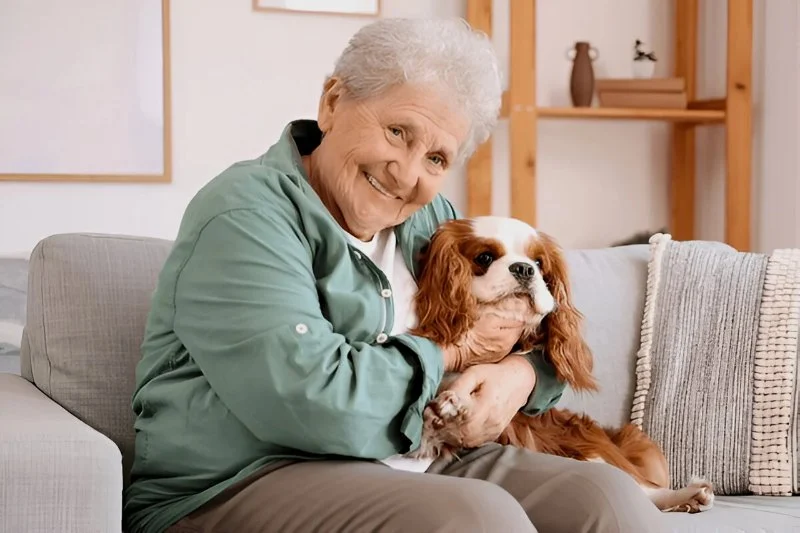
- Why Keeping Aging Pets Comfortable Matters
- Creating a Cozy Living Space for Senior Pets
- Managing Pet Health and Wellness as They Age
- Improving Mobility and Support for Aging Pets
- Real-Life Stories of Caring for Aging Pets
Why Keeping Aging Pets Comfortable Matters
As pets age, they go through physical and mental changes that can affect their comfort and quality of life. Just like people, elderly pets need special care to ensure they feel secure, happy, and healthy. Keeping your aging pet comfortable is crucial not only for their well-being but also for maintaining the bond you share with them.
Comfort is about more than just a cozy bed or extra treats; it involves a holistic approach that takes into account their health, mobility, and emotional needs. Understanding what your aging pet requires and adjusting your home and routines accordingly can make a world of difference in their overall happiness and longevity.
Creating a Cozy Living Space for Senior Pets
The right living environment can significantly improve the comfort of your aging pet. As your pet ages, they may experience joint pain, arthritis, or other mobility issues that make it harder for them to move around. Here are some ways to create a pet-friendly environment that promotes comfort and relaxation:

Great Hearts Animal Hospital of Chandler
ChandlerMaricopa CountyArizona
4015 S Arizona Ave #10, Chandler, AZ 85248, USA
1. Comfortable Bedding
Provide your pet with a soft, supportive bed that cushions their joints. Memory foam beds or orthopedic pet beds are great choices for senior pets as they provide extra support for aging bodies. Place the bed in a quiet, easy-to-access area, away from drafts and high-traffic zones, to help your pet feel secure.
2. Temperature Control
Older pets are more susceptible to temperature extremes, so it’s important to maintain a comfortable room temperature. Keep your pet’s living space warm in winter and cool in summer. Consider using heated pet beds or blankets, especially if your pet suffers from arthritis, as warmth can help soothe their joints.
3. Easy Access to Essentials
As pets age, they may find it harder to get to their food, water, or litter box. Make sure these essentials are within easy reach to minimize the effort your pet needs to put in. Consider placing non-slip mats on floors to help them maintain their footing, reducing the risk of falls.
Managing Pet Health and Wellness as They Age
Aging pets often experience health challenges, but regular monitoring and adjustments to their care routine can make a significant difference in their comfort. Managing their health proactively is key to ensuring they live a happy, healthy life in their later years.
1. Regular Vet Check-ups
Frequent vet visits are essential for aging pets. Regular check-ups allow your vet to monitor your pet’s health, catch early signs of disease, and adjust treatments as necessary. Discuss specific age-related issues such as joint pain, dental health, vision problems, or cognitive decline with your vet so that you can develop a care plan tailored to your pet’s needs.
2. Diet and Nutrition
As pets age, their nutritional needs change. Senior pets may require diets that are lower in calories but higher in fiber to maintain a healthy weight. Look for pet food specifically formulated for senior pets, as these often contain joint supplements, antioxidants, and other nutrients that help support aging bodies.
3. Supplements and Medications
If your pet has joint pain or other age-related issues, supplements like glucosamine or omega-3 fatty acids may help support their health. Consult your vet before adding supplements or medications to your pet’s routine. Some pets may also need prescription medications to manage chronic conditions such as arthritis or heart disease, and ensuring they are taking these medications consistently can help improve their comfort.
Improving Mobility and Support for Aging Pets
Mobility is one of the most noticeable changes in aging pets. If your pet is struggling to move around, there are several ways to help them maintain their independence and comfort:
1. Joint Support and Pain Relief
Arthritis and joint pain are common issues in senior pets. Look for joint-supporting products like orthopedic pet beds, ramps, or steps that help them get up onto furniture or into cars. Additionally, providing joint supplements, as recommended by your vet, can help alleviate pain and improve mobility.
2. Regular Exercise
While it’s important not to overexert your aging pet, light and regular exercise can help maintain their muscle strength and mobility. Short walks, gentle playtime, or swimming (if available) can be great ways to keep your pet active without causing strain on their joints.
3. Mobility Aids
If your pet has trouble walking or standing, mobility aids like pet wheelchairs or harnesses with handles can provide the extra support they need. These aids allow them to move around with more confidence and reduce the risk of falls, which is especially important for pets with limited mobility.
Real-Life Stories of Caring for Aging Pets
Here are a few heartwarming real-life examples of how pet owners have created a comfortable home for their aging companions:
1. Bella, the Senior Labrador
Bella, a 12-year-old Labrador, began to show signs of joint pain as she aged. Her owner, Maria, noticed Bella had trouble climbing stairs and getting onto the couch. Maria decided to make a few changes at home: she added a memory foam dog bed, placed a ramp next to the couch, and started giving Bella joint supplements. Bella’s quality of life improved significantly, and she was able to continue enjoying her favorite activities without pain.
2. Max, the Elderly Cat
Max, a 15-year-old cat, began to slow down and showed signs of arthritis in his back legs. His owner, John, brought him to the vet, who recommended a special diet for joint health. John also created a cozy, quiet space for Max with easy access to food and water. Max now has a comfortable spot to rest and enjoys daily low-impact play sessions. His mobility has improved, and he’s able to maintain a better quality of life in his senior years.
These stories demonstrate how thoughtful adjustments to your pet’s environment and routine can significantly improve their comfort and happiness as they age.








 PetVet Vaccination Clinic4.0 (1 reviews)
PetVet Vaccination Clinic4.0 (1 reviews) The Scaredy Cat Hospital4.0 (213 reviews)
The Scaredy Cat Hospital4.0 (213 reviews) VIP Petcare Vaccination Clinic0.0 (0 reviews)
VIP Petcare Vaccination Clinic0.0 (0 reviews) Blue Paw Primary Pet Care4.0 (225 reviews)
Blue Paw Primary Pet Care4.0 (225 reviews) Teacup Yorkies home0.0 (0 reviews)
Teacup Yorkies home0.0 (0 reviews) Priority Pet Hospital4.0 (393 reviews)
Priority Pet Hospital4.0 (393 reviews) Transitioning Pets to a New Brand: Timelines & Guidelines
Transitioning Pets to a New Brand: Timelines & Guidelines How to Use Behavior Tracking Apps for Pets: Monitor Health & Behavior
How to Use Behavior Tracking Apps for Pets: Monitor Health & Behavior Essential Vitamins & Minerals Pets Need for Healthy Living
Essential Vitamins & Minerals Pets Need for Healthy Living How to Calm a Nervous Pet During a Thunderstorm or Fireworks – Expert Tips
How to Calm a Nervous Pet During a Thunderstorm or Fireworks – Expert Tips Heatstroke Prevention: How to Keep Pets Cool in Summer
Heatstroke Prevention: How to Keep Pets Cool in Summer Monitoring Pet Weight: Tools & Strategies for a Healthy Pet
Monitoring Pet Weight: Tools & Strategies for a Healthy Pet